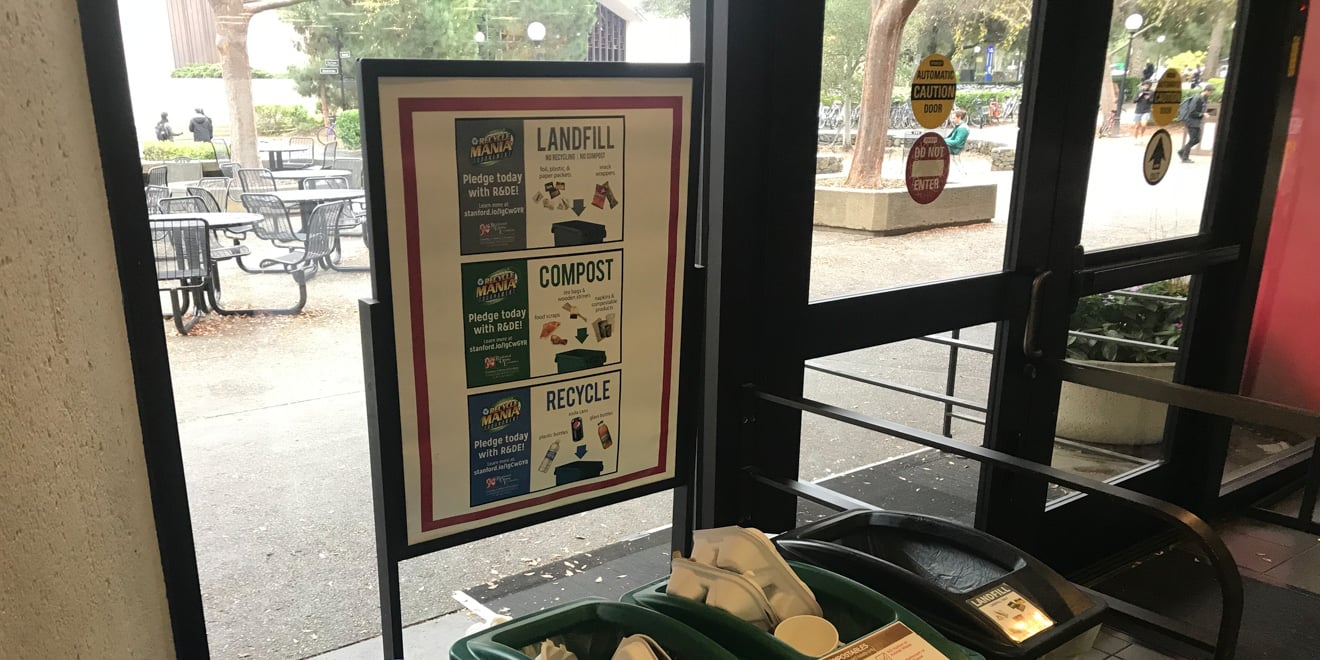Due to the incorrect placement of trash bags in compost bins and in some cases a complete lack of compost bins, a large portion of Tresidder Memorial Union’s compostable waste has been sent to landfills.
Christopher LeBoa ’19, former co-director of Students for a Sustainable Stanford (SSS), said he has been trying to make CoHo more environmentally friendly since his frosh year. At the time, LeBoa’s complaint was the lack of labelling on bins inside CoHo.
“I’ve been trying and failing at [getting CoHo to compost] for a long time now,” he said. “By the time I graduate I want to get them to actually compost right.”
LeBoa added that he, along with other SSS members, has met with Erick Spades, director of operations at Treehouse and CoHo, several times in an attempt to properly label the bins in CoHo.
“We made signs for CoHo to put on the bins. That didn’t happen,” LeBoa said. “We offered even to buy [Spades] compostable bags.”
Now, both Treehouse and CoHo have compostable bags. However, at CoHo, only the recycling bins are labeled, to separate mixed paper from bottles and cans; the compost and trash bins have no such labeling. Julie Muir, manager of Peninsula Sanitary Service, Inc. (PSSI) at Stanford — which manages compost, recycling and waste on campus — said incorrect bags are a major issue when it comes to composting.
“If a café uses a [trash] bag in the compost bin, [the staff] pulls that bag, takes it to the loading dock and throws it in the compost bin; then that compost bin becomes contaminated,” she said. “If you put garbage in a compost bag, the [custodial staff] goes, ‘It’s compost, so it goes in the compost bin.’ If there’s garbage in there, then that also contaminates the compost.”
PSSI holds annual or biannual trainings for Tresidder on how employees should sort waste. But Spades told The Daily he was confused on the protocol surrounding trash bags.
“My understanding from our manager was that [the compost bags] were all supposed to be green,” he said. “Now I’ll obviously take care of [reorganizing]. It kind of throws me off because I wouldn’t suspect that if [waste] weren’t in a trash bag that they would consider it compost.”
While CoHo has received complaints related to waste bin labeling, the Jamba Juice restaurant in Tressider does not sort any waste but cardboard, according to former Jamba Juice employee Myriam Yao ’20.
“All the cardboard went into one [bin], but everything [else] did go into landfill,” she said.
Muir believes this could be a result of improper first-day orientation from the managers at Jamba Juice.
“I think it comes down to training,” she said. “What I hear about the service industry in general is you have a high turnover rate — yes, that’s true, but there’s got to be a way to get around that.”
To make Treehouse and CoHo more eco-friendly, Spades said he has ordered special three-slot bins for landfill, recycling and compost — with CoHo- and Treehouse-specific labelling — from a company in Canada.
LeBoa said it has taken years of heavy effort and constant meetings with Spades to reach the current level of composting at CoHo and Treehouse; he also said that Spades has not followed through with past promises regarding composting.
“At the beginning of last year, [SSS] talked to [Spades] again, and he said, ‘I’ve ordered new bins. They’re on their way,’” LeBoa said, “but they never came.”
Rachel Hu ’21, a zero-waste intern at PSSI at Stanford, said she hopes students will be more conscious of trash bags in compost bins in the future.
“When you’re at an establishment and you see their bags are off, just be aware of that,” Hu said. “You could choose to either tell the establishment or take your business elsewhere.”
LeBoa said he hopes compost organization at Tresidder will increase in the near future. In recent years, Stanford as a whole has set multiple goals regarding sustainability and has worked to reduce greenhouse gas emissions, energy expenditures and water use.
The University began compostable and food waste collection in January 2003. It has since replaced many plastics on campus with compostable materials. Dining halls and other campus buildings now have labeled bins where students may dispose of their compost, recycling and trash. Most of the dining halls’ compost goes to Sustainable Alternative Feed Enterprises (SAFE), an animal feed facility in Santa Clara. Other compost on campus, including compostable cups and utensils, goes to the Newby Island Resource Recovery Park for use in making soil.
Unlike the restaurants at Tresidder, Residence and Dining Enterprises (R&DE) has a strict composting system.
“R&DE was an early adopter of composting on campus,” wrote R&DE spokesperson Jocelyn Breeland in an email to The Daily. “When the University’s composting program began in 2003, select R&DE offices, cafes and Student Housing buildings piloted compost collection, on a voluntary basis, until 2013. Nearly all of these pilots resulted in a 50 percent reduction in landfill waste.”
Since then, R&DE has implemented more composting systems across campus, including in residences and office spaces, which actually proves cost-effective for the University. Breland noted that “while there are costs associated with composting (bins, bags, signs), the compost collection itself is slightly less expensive than dumping the waste in a landfill.”
LeBoa said he hopes Tresidder will follow in the footsteps of R&DE’s composting programs.
“[The University has] this goal of zero waste by 2030, and we’re never going to achieve that if places like CoHo don’t have the infrastructure to do that, and if students don’t care,” LeBoa said.
Contact Clara Kieschnick at ckiesch ‘at’ stanford.edu.
